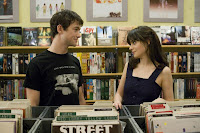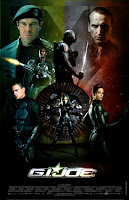 “That One Scene” is a new (and hopefully recurring) series on The Reel Deal where I examine that one scene in a certain movie that sets it apart from all others.
“That One Scene” is a new (and hopefully recurring) series on The Reel Deal where I examine that one scene in a certain movie that sets it apart from all others.
Movie Review: District 9
 For decades, Hollywood has been fascinated with the concept of life on other planets. The first films about extraterrestrial life began as ones where the aliens were portrayed as villainous, inhumane creatures looking to enslave the human race. Then, in the late 1970s, things turned around when Steven Spielberg proposed the idea that maybe the invading aliens were nothing but friendly, curious creatures. Stemming from that idea is “District 9,” one of the biggest surprises of the summer.
For decades, Hollywood has been fascinated with the concept of life on other planets. The first films about extraterrestrial life began as ones where the aliens were portrayed as villainous, inhumane creatures looking to enslave the human race. Then, in the late 1970s, things turned around when Steven Spielberg proposed the idea that maybe the invading aliens were nothing but friendly, curious creatures. Stemming from that idea is “District 9,” one of the biggest surprises of the summer.
If You Want Quality TV: Mad Men
 In case you haven’t caught up with the incessant (but well deserved) media coverage in the past few weeks, television’s best drama, “Mad Men,” will be making it’s triumphant return tomorrow. The season three premiere will be airing Sunday, August 16 at 10 PM on AMC.
In case you haven’t caught up with the incessant (but well deserved) media coverage in the past few weeks, television’s best drama, “Mad Men,” will be making it’s triumphant return tomorrow. The season three premiere will be airing Sunday, August 16 at 10 PM on AMC.
Movie Review: (500) Days of Summer
 Ad campaigns can often be misleading. They can make a bad movie look good, and a good movie look bad. Other times, they can make a totally original, breath of fresh air seem like a cliche drag. That was just about the case for “(500) Days of Summer.” All I can say is, the final product totally proved me wrong.
Ad campaigns can often be misleading. They can make a bad movie look good, and a good movie look bad. Other times, they can make a totally original, breath of fresh air seem like a cliche drag. That was just about the case for “(500) Days of Summer.” All I can say is, the final product totally proved me wrong.
What the Success of G.I. Joe Says About America
.jpg) Like him or not, comedian Bill Maher often makes some interesting (and very true) observations. On his show last Friday, he remarked how stupid and misinformed Americans have become (I can’t find the video, but the transcript is here).
Like him or not, comedian Bill Maher often makes some interesting (and very true) observations. On his show last Friday, he remarked how stupid and misinformed Americans have become (I can’t find the video, but the transcript is here).

John Hughes: The Man Who Made High School a Little Less Miserable Dies at 59
 It’s been a strange summer. Ed McMahon, Farrah Fawcett, Karl Malden, and Walter Cronkite all succumbed to long, terminal illnesses. Meanwhile, Michael Jackson and Billy Mays both died unexpectedly. Today, another great was lost unexpectedly. John Hughes, the renowned director of such 80s classics as “Ferris Bueller’s Day Off,” “The Breakfast Club,” “Weird Science,” and “Sixteen Candles,” died today of a heart attack. He was 59.
It’s been a strange summer. Ed McMahon, Farrah Fawcett, Karl Malden, and Walter Cronkite all succumbed to long, terminal illnesses. Meanwhile, Michael Jackson and Billy Mays both died unexpectedly. Today, another great was lost unexpectedly. John Hughes, the renowned director of such 80s classics as “Ferris Bueller’s Day Off,” “The Breakfast Club,” “Weird Science,” and “Sixteen Candles,” died today of a heart attack. He was 59.

TV Review: How I Met Your Mother
The traditional sitcom is not dead yet. No, it has been reborn–maybe only for a brief moment, but it certainly is npt yet dead. What the traditional sitcom needed was a shot of unconventionality, a shot “How I Met Your Mother” was able to deliver.
More Thoughts on Funny People
 This is an unofficial second review of Funny People. Some movies are just so big, they need to be reviewed twice.
This is an unofficial second review of Funny People. Some movies are just so big, they need to be reviewed twice.
Movie Review: Funny People
 Judd Apatow is the comedy legend of our day. It seems that just about everything he touches turns to gold. After a few years of small producing and writing efforts, Apatow returns with his first directorial effort in two years with “Funny People.” At first, it might not seem like comic gold. But under its scratched surface, lies a diamond in the rough.
Judd Apatow is the comedy legend of our day. It seems that just about everything he touches turns to gold. After a few years of small producing and writing efforts, Apatow returns with his first directorial effort in two years with “Funny People.” At first, it might not seem like comic gold. But under its scratched surface, lies a diamond in the rough.
Movie Review: Gonzo
 “Football season’s over. No More Games. No More Bombs. No More Walking. No More Fun. No More Swimming. 67. That is 17 years past 50. 17 more than I needed or wanted. Boring. I am always bitchy. No Fun — for anybody. 67. You are getting Greedy. Act your old age. Relax — This won’t hurt.”
“Football season’s over. No More Games. No More Bombs. No More Walking. No More Fun. No More Swimming. 67. That is 17 years past 50. 17 more than I needed or wanted. Boring. I am always bitchy. No Fun — for anybody. 67. You are getting Greedy. Act your old age. Relax — This won’t hurt.”
